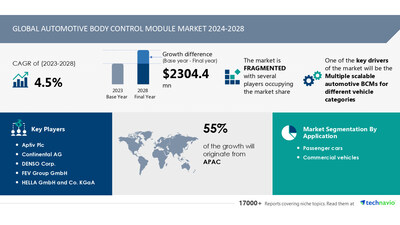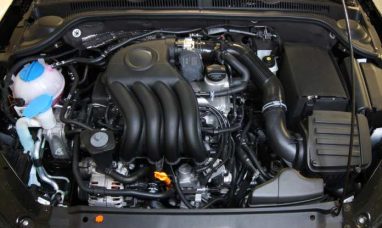NEW YORK, Oct. 11, 2024 /PRNewswire/ — Report with market evolution powered by AI – The Global Automotive Body Control Module Market size is estimated to grow by USD 2.30 billion from 2024-2028, according to Technavio. The market is estimated to grow at a CAGR of over 4.5% during the forecast period. Multiple scalable automotive BCMS for different vehicle categories is driving market growth, with a trend towards increasing demand for small and reliable automotive BCMS . However, increasing cost pressure faced by OEMS poses a challenge – Key market players include Aptiv Plc, Continental AG, DENSO Corp., FEV Group GmbH, HELLA GmbH and Co. KGaA, Hitachi Ltd., Hyundai Motor Co., Infineon Technologies AG, Information Technologies Institute Intellias LLC, Lear Corp., Mitsubishi Electric Corp., Nidec Corp., NXP Semiconductors NV, OMRON Corp., Renesas Electronics Corp., Robert Bosch GmbH, Samvardhana Motherson International Ltd., STMicroelectronics International N.V., and Texas Instruments Inc.
AI-Powered Market Evolution Insights. Our comprehensive market report ready with the latest trends, growth opportunities, and strategic analysis- View your snapshot now
|
Forecast period |
2024-2028 |
|
Base Year |
2023 |
|
Historic Data |
– |
|
Segment Covered |
Application (Passenger cars and Commercial vehicles) and Geography (APAC, North America, Europe, South America, and Middle East and Africa) |
|
Region Covered |
APAC, North America, Europe, South America, and Middle East and Africa |
|
Key companies profiled |
Aptiv Plc, Continental AG, DENSO Corp., FEV Group GmbH, HELLA GmbH and Co. KGaA, Hitachi Ltd., Hyundai Motor Co., Infineon Technologies AG, Information Technologies Institute Intellias LLC, Lear Corp., Mitsubishi Electric Corp., Nidec Corp., NXP Semiconductors NV, OMRON Corp., Renesas Electronics Corp., Robert Bosch GmbH, Samvardhana Motherson International Ltd., STMicroelectronics International N.V., and Texas Instruments Inc. |
Key Market Trends Fueling Growth
The Automotive Body Control Module (BCM) market is witnessing significant growth due to the increasing complexity of vehicle designs. While multiple BCMs are used to manage the electronic content in vehicles, there is a rising demand for compact and reliable BCMs. Manufacturers like Aptiv Plc, Continental AG, Robert Bosch GmbH, Texas Instruments Inc., and DENSO Corp., are meeting this demand by producing small, yet powerful BCMs. These BCMs enable efficient communication between electronic body components using ASIC and SMD technology. The compact size of these modules ensures that they can effectively deliver safety, comfort, and convenience functions in real-time to end-users. This trend towards innovation and the need for small, reliable modules is expected to drive the global automotive BCM market during the forecast period.
The Automotive Body Control Module (BCM) market is experiencing significant growth, driven by the increasing demand for advanced features in vehicles. BCMs control various functions such as lighting, windows, door locks, wipers, switches, sensors, and more in both passenger cars and commercial vehicles. Trends in this market include the integration of AI, energy efficiency, safety features, and smart infrastructure in electric and autonomous vehicles. Personalized in-car experiences, telematics, infotainment systems, keyless entry, and automatic wipers are also gaining popularity. BCMs use various networks like Controller Area Network (CAN), Local Interconnect Network (LIN), and Ethernet to connect various vehicle systems. Vehicle connectivity through Bluetooth, Wi-Fi, NFC, and IoT is also on the rise, enabling features like voice recognition and cloud services. Safety systems, such as electronic control units, lights, power windows, central locking, climate control, horn, and sensors, are essential components of BCMs. Overall, the market for BCMs is expected to grow significantly due to the increasing demand for advanced features in vehicles.
Insights on how AI is driving innovation, efficiency, and market growth- Request Sample!
Market Challenges
- OEMs face significant cost pressure due to increasing regulations and customer demands, leading to higher production costs. Stringent emission norms and substantial R&D investments add to the financial burden. To maintain profitability, OEMs absorb these costs, limiting their ability to pass them onto consumers. Consequently, they must reduce production costs and ensure product quality. Outsourcing manufacturing to low-cost countries, such as China, Taiwan, and South Korea, is a common strategy. However, rising labor costs in these countries pose a challenge. These factors may negatively impact the automotive Body Control Module (BCM) market, as OEMs seek cost savings without compromising quality.
- The Automotive Body Control Module (BCM) market is witnessing significant growth due to the increasing demand for advanced comfort and security features in passenger cars. BCMs manage various functions such as power windows, central locking, climate control, horn, voice recording, and vehicle connectivity. Challenges in this market include integrating new technologies like Internet of Things (IoT), smartphones, cloud services, Bluetooth, Wi-Fi, and Near Field Communication. Automakers are partnering with Tier 1 suppliers to develop BCMs that can handle CAN, Ethernet, and other bus systems. Security and access are key concerns, with BCMs acting as gateways for remote modules and loads. ECUs, microcontrollers, printed circuit boards, input-output devices, and bus transceivers are essential hardware components. BCMs must cater to various vehicle model variants and vehicle types, including light-duty vehicles.
Insights into how AI is reshaping industries and driving growth- Download a Sample Report
Segment Overview
This automotive body control module market report extensively covers market segmentation by
- Application
- 1.1 Passenger cars
- 1.2 Commercial vehicles
- Geography
- 2.1 APAC
- 2.2 North America
- 2.3 Europe
- 2.4 South America
- 2.5 Middle East and Africa
1.1 Passenger cars- The automotive body control module (BCM) market holds significant growth potential, particularly in the passenger cars segment. BCMs in passenger cars manage various electronic accessories and systems, such as lighting, windows, door locks, seat controls, air conditioning, and more. They ensure the smooth operation of these systems, enhancing the driving experience and vehicle safety. The increasing demand for advanced and connected passenger cars is a major market driver. Modern passenger cars incorporate sophisticated electronics, necessitating BCMs to manage system complexity efficiently. The rise of electric and hybrid vehicles further boosts demand for advanced BCMs due to their intricate control requirements. Technological advancements, including autonomous driving features and advanced driver assistance systems (ADAS,) fuel market growth. These features require reliable and efficient BCMs for proper functionality and safety. Consumer expectations for comfort, convenience, and enhanced vehicle performance also drive demand for innovative BCM solutions. Automakers invest in research and development to integrate cutting-edge technologies, catering to evolving market needs. These factors are expected to drive the growth of the passenger cars segment of the automotive BCM market during the forecast period.
Download complimentary Sample Report to gain insights into AI’s impact on market dynamics, emerging trends, and future opportunities- including forecast (2024-2028) and historic data ( – )
Research Analysis
The Automotive Body Control Module (BCM) market refers to the electronic control devices used in vehicles to manage various body functions. These functions include lighting systems, windows, door locks, wipers, switches, sensors, and more. BCMs are integral to modern vehicles, enhancing comfort, convenience, and safety. They are found in both traditional internal combustion engine (ICE) vehicles and electric vehicles (EVs). In ICE vehicles, BCMs manage various systems such as power windows, central locking, climate control, horn, and access controls. In EVs, they also manage charging systems and vehicle connectivity features. BCMs use a network of sensors and switches to monitor vehicle conditions and respond accordingly. They communicate with other vehicle systems through the Electronic Control Unit (ECU) and Gateway modules. BCMs also support advanced safety systems and offer voice recording and security features. Remote modules allow for keyless entry and start, while loads control ensures efficient power distribution.
Market Research Overview
The Automotive Body Control Module (BCM) market encompasses various electronic systems that manage and control various functions in vehicles, including lighting, windows, door locks, wipers, switches, sensors, and more. These modules are essential components in both passenger cars and commercial vehicles, enhancing safety, comfort, and convenience. The market is witnessing significant growth due to the increasing adoption of electric vehicles and autonomous vehicles, which require advanced BCM systems for energy efficiency, safety features, and autonomous driving capabilities. AI, smart infrastructure, telematics, infotainment systems, and personalized in-car experiences are driving the market’s growth. The BCM market includes various hardware components, such as microcontrollers, printed circuit boards, input-output devices, bus transceivers, and Controller Area Network (CAN) and Local Interconnect Network (LIN) systems. Tier 1 suppliers play a crucial role in supplying these components to automakers for various vehicle model variants and types, including passenger cars, light-duty vehicles, and commercial vehicles. Vehicle connectivity through the Internet of Things (IoT), smartphones, cloud services, Bluetooth, Wi-Fi, and Near Field Communication (NFC) is also a significant trend in the market. Security and access controls are essential considerations for BCMs, ensuring the protection of vehicles and their occupants.
Table of Contents:
1 Executive Summary
2 Market Landscape
3 Market Sizing
4 Historic Market Size
5 Five Forces Analysis
6 Market Segmentation
- Application
- Passenger Cars
- Commercial Vehicles
- Geography
- APAC
- North America
- Europe
- South America
- Middle East And Africa
7 Customer Landscape
8 Geographic Landscape
9 Drivers, Challenges, and Trends
10 Company Landscape
11 Company Analysis
12 Appendix
About Technavio
Technavio is a leading global technology research and advisory company. Their research and analysis focuses on emerging market trends and provides actionable insights to help businesses identify market opportunities and develop effective strategies to optimize their market positions.
With over 500 specialized analysts, Technavio’s report library consists of more than 17,000 reports and counting, covering 800 technologies, spanning across 50 countries. Their client base consists of enterprises of all sizes, including more than 100 Fortune 500 companies. This growing client base relies on Technavio’s comprehensive coverage, extensive research, and actionable market insights to identify opportunities in existing and potential markets and assess their competitive positions within changing market scenarios.
Contacts
Technavio Research
Jesse Maida
Media & Marketing Executive
US: +1 844 364 1100
UK: +44 203 893 3200
Email: [email protected]
Website: www.technavio.com/
![]() View original content to download multimedia:https://www.prnewswire.com/news-releases/automotive-body-control-module-market-to-grow-by-usd-2-30-billion-from-2024-2028-driven-by-scalable-bcms-for-various-vehicle-categories-report-on-ai-redefining-market-landscape—technavio-302273551.html
View original content to download multimedia:https://www.prnewswire.com/news-releases/automotive-body-control-module-market-to-grow-by-usd-2-30-billion-from-2024-2028-driven-by-scalable-bcms-for-various-vehicle-categories-report-on-ai-redefining-market-landscape—technavio-302273551.html
SOURCE Technavio

Featured Image: Megapixl @ Byrdyak

















